Louis C.K. Interview — Writing and Directing “Louie” on FX
I can’t call upon the writing the same as the other jobs…The writing has the most pressure, it’s the toughest but it’s also the most rewarding when it works out.
Louis C.K. is the Creator, Executive Producer, Writer, Director, Editor and Star of the series Louie on the FX Network. Louie is a half hour, single-camera dramedy that usually tells two stories that are often unrelated and intersperses them with Louis C.K. doing stand-up comedy on New York stages like The Comedy Cellar and Caroline’s. Louie is a very unique, dark, quirky experience, unlike any show on television, now or in the past; the closest comparison I can make to the tone would be to old Woody Allen comedies. I think of the show as Annie Hall meets Seinfeld, but darker.
Louie airs Thursdays at 10:30 P.M. on FX and is currently in its second season.
I joined an extended conference call interview with a group of bloggers and Louis C.K. I’ve noted my personal questions near the bottom. As with my interview with him last year, I tried to get him talking about his writing process.
Q: WHAT IS THE FORMULA FOR GOOD COMEDIC TV?
LOUIS C.K.: Oh, jeez. I think it really depends on the comedian and the show. It’s gotta be funny and compelling, both. It just has to be good.
YOU’RE DOING EVERYTHING ON THE SHOW (WRITING, DIRECTING, EDITING, STARRING). WHICH ASPECT IS MOST DIFFICULT FOR YOU?
The writing is the most difficult since that’s where it starts and if I don’t get it done then I can’t do the rest…there’s nothing to shoot.
I can’t call upon the writing the same as the other jobs. If I’m having a bad day, I can have a strong coffee and sort of direct well. But with writing, if I’m sort of down, just nothing comes and the whole show collapses. The writing has the most pressure, it’s the toughest but it’s also the most rewarding when it works out.
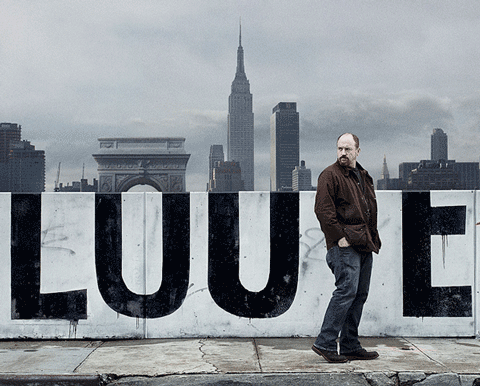
LOUIE HAS A LOT OF PATHOS, NOT JUST GOING FOR THE JOKE BUT BRINGING HUMANITY ALONG WITH THAT. WHAT MADE YOU DO THAT?
It all starts with funny for me, but I think it’s funnier if it’s more real and have other things going on. Comedy that lives in a Petri dish, you know like comedy movies or sitcoms, where everything is geared technically towards funny, they can make you laugh in a physical way, but when you’re put into a story where you’re really invested in what’s happening emotionally, with your curiosity and suspense all of those other things you can stimulate, then funny fires on more cylinders. It just makes more of you laugh. It makes you laugh as an emotional relief, or as surprise, not just “wow, that was a well-written joke” but like “Holy shit, that was so funny because of what happened before and because of what happened to that poor guy” and all of that.
DO YOU LISTEN TO YOUR CRITICS?
I definitely indulge in self-Googling at times (laughs). When it’s about the TV work, it’s definitely interesting to get feedback from critics who are really thoughtful about what they watched. Criticism is an art form, like literary criticism. I didn’t go to college, so I missed out on writing papers and getting feedback and all of that. But as a stand-up, I don’t worry about it. Me and the audience have our own eco-system. I don’t let it get in my head but it’s interesting to read what people have to say.
ON THE SEASON ONE DVD COMMENTARY, YOU SHOW YOURSELF TO BE A FILM BUFF, IN TERMS OF LENSES AND TECHNICAL DETAILS OF PRODUCTION. ANYTHING COMING UP THAT YOU’RE EXPERIMENTING WITH IN FILMING AND EDITING?
Absolutely. We got better as a crew. A film crew is like a sports team, the more you play together…you learn each others moves. We were way better this year, what everyone brings to the set…our language of working together. Visually, we usually rented these master prime lenses but we bought this vintage set of lenses, very old Super Baltar Bausch & Lomb lenses so we kind of own this look. We also used a split diopter, which was new to us. This season is much more ambitious, so visually it’s going to be a better looking show, and the music is better, too, but as far as my editing…I wish I had more time — the show would be better if I had more time to do it!
I don’t storyboard or make a shot list because I think that’s a little arrogant. Directing is like sailing, being in a boat — you’re going to get out there and see what you’re faced with…
IN THE EPISODE “BUMMER/BLUEBERRIES,” ARE EITHER OF THOSE STORIES BASED ON REAL WOMEN YOU KNEW OR DATES YOU WENT ON?
No! That’s just a fantasy I made up. There’s a lot of very attractive, well put-together women that work in show business, like assistants and agents I’ve met, and people who work on TV shows, and the few times I’ve reached out to one of them, it’s been a laughable gulf between us.
The thing with the homeless guy, that kind of stuff happens in New York where you suddenly get targeted by someone. I got this thing in my head…What if I started a story with a really grisly, horrible thing happening that involved me but didn’t involve me enough for me to have to stop? The reason his head comes off was because I wanted to make it clear that there was nothing I could have done to help. If he had just been hit by the truck, I would have stayed there and waited for the ambulance, but once the head comes off, there’s pretty much no more obligation to stick around.
With “Blueberries,” the mom at the school (who approaches Louie to have casual sex but turns out to be very high maintenance and sado-masichistic), was an idea that Pamela Adlon and I came up with. Two minutes after the show got renewed for the second season, I started worrying that I didn’t have enough stories, so Pamela and I just started talking and I think we came up with that in about five minutes, just hitting it back and forth.
YOU DO SO MANY ROLES ON THE SHOW. IS THERE AN AREA YOU’D LIKE TO LEARN OR HAVE MORE CONTROL OVER?
Weirdly, costume design? I bought a sewing machine for my daughter, and we started making shirts and stuff and I went crazy, I loved it! I used to watch Project Runway, so yeah, I’d probably make all the clothes if I could. (laughs) I like costume design, it’s really great.
SOME OF YOUR EARLY STAND-UP MATERIAL WAS MORE ABSURD, NOW IT SEEMS TO COME FROM A MORE DEEPLY PERSONAL PLACE. WHERE AND WHEN DID THE CHANGE HAPPEN?
At first with stand-up, you’re just trying to learn how to be on stage…having a presence on stage is the first huge leap. It takes a good 15 years, until then you’re just trying to think of funny stuff, come up with material. At some point you cross the line, and I don’t quite remember when it happened with me, where you are on stage and it’s second nature, it doesn’t feel like such a big deal anymore and you can say anything. I realized the thoughts I’m having, like the one big thought you have in a week — a big feeling — I’ve learned that’s good comedy material. I used to think that’s the “real” inside of your brain and then you come up with external observations for comedy, but then I learned that, no, you go to the big thought and people will like it. Learning is exponential — I’m not sure that’s what I’m trying to say, but once something works, you try it a bunch of times and it becomes like a mudslide in that direction.
WHO WERE YOUR COMEDY INFLUENCES GROWING UP?
Bill Cosby was the first. George Carlin, Richard Pryor and then Steve Martin. Steve Martin was the first person that made me think I could do it, because I had an absurd “voice” of humor — he opened up the possibility that you could do stand-up that wasn’t simple, just telling stories and jokes, because he was so strange.
I loved Woody Allen, and Eddie Murphy made me laugh really hard even though I never thought I could be a comedian like him. Steven Wright was from Boston where I started and he inspired me a lot. And Joan Rivers. I loved Joan Rivers.
CAN YOU TALK ABOUT WORKING WITH JOAN RIVERS (WHO PLAYS HERSELF IN THE FOURTH EPISODE, “JOAN”)?
Joan has a big part, it’s not just a cameo. I had seen her movie A Piece of Work and I loved it. She had such a great work ethic and attitude that’s on display in the movie. I sent it to her and she suggested a few funny lines and I put them in and she just came and worked really hard. It’s a long scene and she had a tremendous amount to say. One of the more conscientious people I’ve worked with. When we would all break for a snack and I’d go over to the snack table, she’d stay on set and go over her cards and script. She’s a great lady and I’ll benefit for the rest of my life for meeting her and getting to work with her.
Mostly, I just try to make it feel organic. When you overwrite stuff it becomes “writerly,” it starts to feel written. The people on the screen start having less of a life, looking a little more like paper.
THE FIRST SEASON YOU WERE SHOOTING VERY GUERRILLA ON THE STREETS OF NEW YORK. HOW HAS SHOOTING THE NEW SEASON CHANGED SINCE YOU’RE MORE WELL KNOWN NOW?
New York is a great place to shoot because they kind of don’t give a shit that you’re shooting. I’m not involving other people like Sacha (Baron Cohen) with Borat. My kids keep me grounded and full of ideas and inspiration because (show business is not interesting to people).
To me, the second season has to be better than the first. That’s my goal. You have to dig deeper and find new ways (to do it). TV is a very rough business. It’s kind of like a desert and you have to be like a cactus. You have to be a kind of plant that has a lot of ways to draw a lot of nutrients from the soil (laughs) and it has to develop and evolve quickly. The first year I was like a rookie pitcher and I’ve faced every batter in the league now and they all know me. So I need to develop a slider now.
The episode “Pregnant,” the Season Two opener…started with sweet stuff about the kid, then awful stuff with a very dramatic introduction of this character, then a fucking terrifying emergency, then strange, interesting characters from across the hall and then the greatest, loudest fart of all time!
I’m just trying to keep people out of the box, so don’t dig in too hard.
WHAT’S COMING UP THIS SEASON?
More single story episodes this season and a lot more of me engaged with the kids, longer dialogue with them. The first season was more about my early time as a single dad, more bewildered and unsure, now it’s more about being engaged with them as human beings, not just a comedy crutch. The great thing is that if you missed the first season, it doesn’t matter, at all. It’s completely different with (all new characters and situations).
I think the first page is more important than a logline — if there’s something in the first page or the dialogue that feels different.
DAN: I HAVE A LOT OF READERS WHO ARE SCREENWRITERS SO I WANT TO ASK YOU ABOUT WRITING. HOW HAS YOUR WRITING PROCESS CHANGED FROM SEASON ONE TO TWO, AND, IN GENERAL, HOW DO YOU CRAFT THE JOKES IN A COMEDY SEQUENCE, LIKE WHEN YOU’RE BLOCKING OUT A SCENE TO GET THE BEST JOKES AND ROLL WITH IT WITH THE ACTORS ON SET?
I try to write as much as I can before we go into production. I don’t have a staff, so I don’t have the same process as other shows. I don’t “break” stories, like other sitcoms, where you put the show up on a timeline and you discuss it and make sure it’s functioning as a an engine before you write it. Then you piece it out and somebody writes this part or writes all of it; then you table it and the whole table gives notes and words to improve it. And usually all of those notes change the structure so you sort of re-break the story with the dialogue already in place and then you put in the jokes, sort of at the end.
But I write it all myself so I don’t do that. I have stories rolling around in my head and usually I’ll have a surge of realizing what it is and where it’s supposed to go — and then I’ll just sit down and just shit it out, I just write it.
The jokes just kind of come. There’s not “jokes” in my show like trading of quips, that kind of Will and Grace type punch-up jokes. I don’t do that, so the jokes just end up being how the folks talk, it just ends up coming out that way. Writing the characters, I try to get them really in my head and then I just trade dialogue, from one end of the scene to the other. Then I don’t generally go back and rewrite much. When I’m on the set, because I’m the writer, I can make audible calls and cut lines and add maybe one or two. Mostly, I just try to make it feel organic — when you overwrite stuff it becomes “writerly,” it starts to feel written — the people on the screen start having less of a life, looking a little more like paper.
DAN: HOW IMPORTANT TO YOU ARE LOGLINES? IF A FRIEND ASKS YOU TO READ THEIR SCRIPT OR AN AGENT WANTS YOU TO READ A SCRIPT BECAUSE THEY’RE CONSIDERING YOU FOR A ROLE, HOW MUCH STOCK WILL YOU PUT IN THAT ONE SENTENCE LOGLINE, AS FAR AS THE CONCEPT, WHETHER YOU’RE GOING TO READ IT OR NOT?
I don’t read a lot of scripts. I guess the logline is a clue into what you’re going to read. If it sounds familiar, like you read a logline that says, A kid is in college and he goes on a road trip to find himself, you kind of know what that’s going to be.
But (to decide to read it) I think you go more by maybe who wrote it or where it comes from; you flip through the first few pages and see how it opens. I think the first page is more important than a logline — if there’s something in the first page or the dialogue that feels different.
I remember this story about when Stallone was shopping his Rocky script. I think it was Irwin Winkler, or some veteran producer, who wasn’t interested because it was a boxing movie. But he gave it a shot and said, “Four pages in, they’ve got the guy talking to his turtles, so I said, What the hell is this?” So that’s what got him interested in the script, because in the pages it was different than what he was expecting.
Now, if the logline is pushing people away, you don’t have much of a chance anyway.
DAN: A QUICK QUESTION ABOUT DIRECTING, YOU USE LONG TAKES, COVERING A SCENE IN A SINGLE SHOT. YOU HAD A REALLY GREAT LONG TAKE IN “BUMMER” ON THE BRIDGE WITH YOUR DATE. DO YOU KNOW GOING IN THAT DAY THAT YOU’RE GOING TO SHOOT A SCENE IN A SINGLE TAKE OR DO YOU FIGURE IT OUT ON THE SET? WHAT INFORMS THAT DECISION?
There’s definitely scenes that are more prone to being a long Master than other ones, whereas others I have it in my head that they need more coverage. I don’t storyboard or make a shot list because I think that’s a little arrogant. Directing is like sailing, being in a boat — you’re going to get out there and see what you’re faced with — and it’s also going to be a lot different than what you expected, especially with low budget filming. Also, I like showing up and sitting down with my DP and (figuring out how to shoot it). I do like long Masters. When you cut away from a scene you’ve broken the tension and the believability, a tiny bit. If you stay with one Master, there’s something about it that keeps people engaged. In that case (the shot on the bridge), the Master develops — it becomes a two shot, then a close-up — we had a guy on a Steadicam moving all around us, so it stayed interesting.
Long Masters are something I learned from watching the DVD of Rebel Without a Cause: the scene where James Dean is being yelled at by both parents on the stairs. In the movie it was (a lot of cuts), but on the DVD they showed you just one long Master Shot of the scene. It was heartbreaking; it was one of the saddest things I’ve ever watched. It had WAY more power. It looked like we were really in James Dean’s house being abused by two parents.
WHAT ARE SOME OF THE DECISIONS YOU MAKE TO KEEP EXPENSES DOWN ON THE SHOW AND WHETHER THAT AFFECTS THE TYPE OF STORIES THAT YOU WANT TO TELL?
I haven’t found anything like “boy, if we had more money I wish we could do that.” I would like to have more time, more luxury of time. If we could spend one day shooting one scene, that would be great! The show would just get better by paying more attention to each moment of the show.
We shoot a LOT in one day. We pack our shooting days, shooting like three scenes from three different episodes in one day. We know how to do that but it’s exhausting. We also do that because I only work three days a week so I can be with my kids the other days of the week. I don’t work on the days I have my kids.
We pay everyone well but have a small crew; there’s no trailers, I just sit in my car between takes. We don’t have series regulars, which drops an enormous amount out of the budget (and also forces you to use them in every episode) and we can hire more extras and upgrade them with a line and pay them as a principle. I also know a lot about production so that helps; I go through equipment lists and tell them what we’re not going to need.
We don’t bring a lot of lights – I have the best D.P. in the world and he shoots really well with natural light and we shoot with these fast lenses. We use a Seven Jib rather than laying track, which is cheaper and takes up less real estate. And I think we’re well liked by vendors, the city and the unions, who have been very nice to us. That’s how we keep the cost down.
Thanks to Louis C.K., Kristy Silvernail and FX for the interview.
Good Luck and Happy Writing,
Dan Calvisi
p.s. Check out this video from 1992 from Caroline’s vaults. Louis Black in a leather trenchcoat, Colin Quinn with a mullet, Jon Stewart, Dave Attell and Louis C.K. as the Three Stooges…and is that Paul Giamatti as the producer?

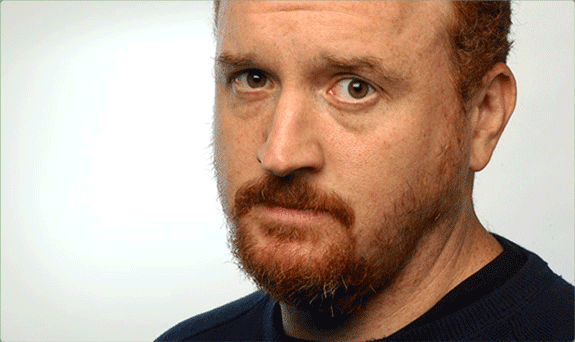
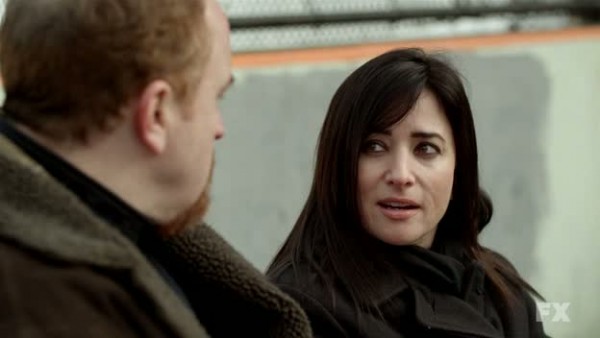
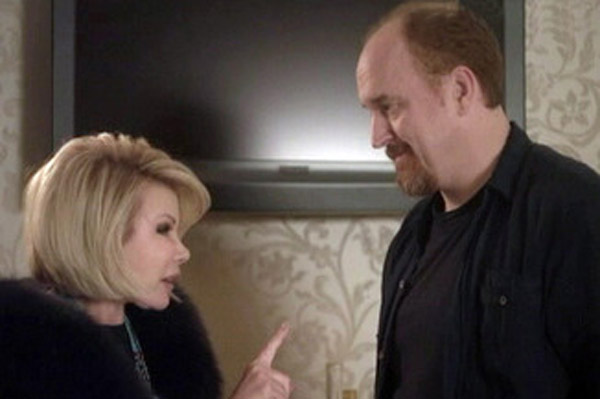
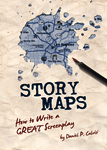
Great interview, Dan! I LOVE Louis.
Thanks Hilary! How’s your filmmaking going? We need to catch up.